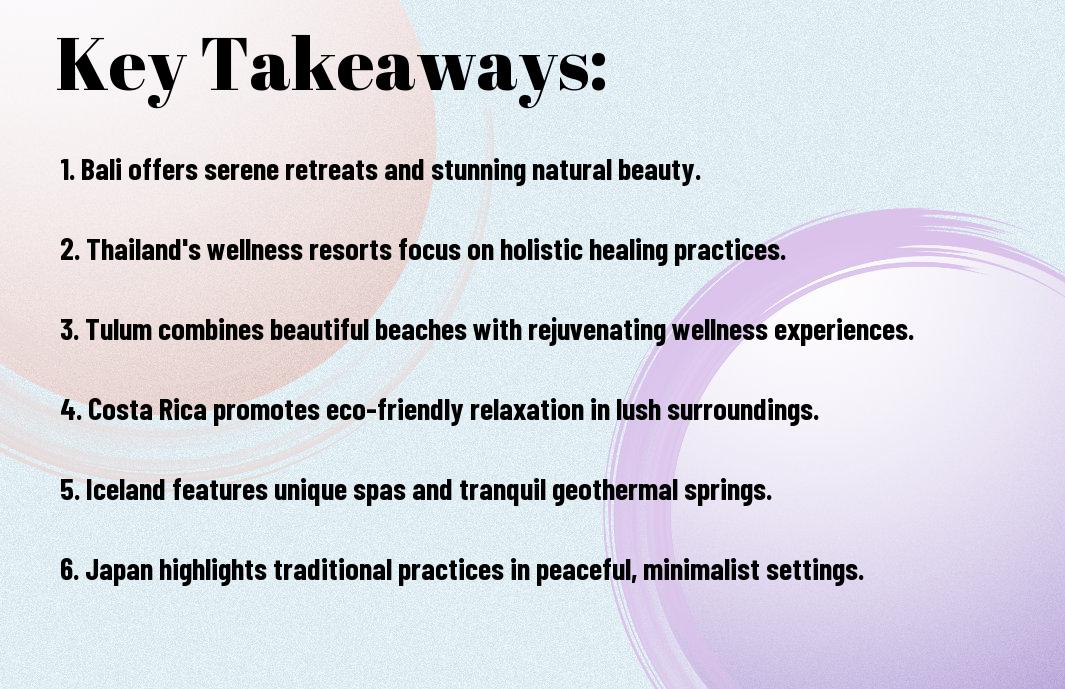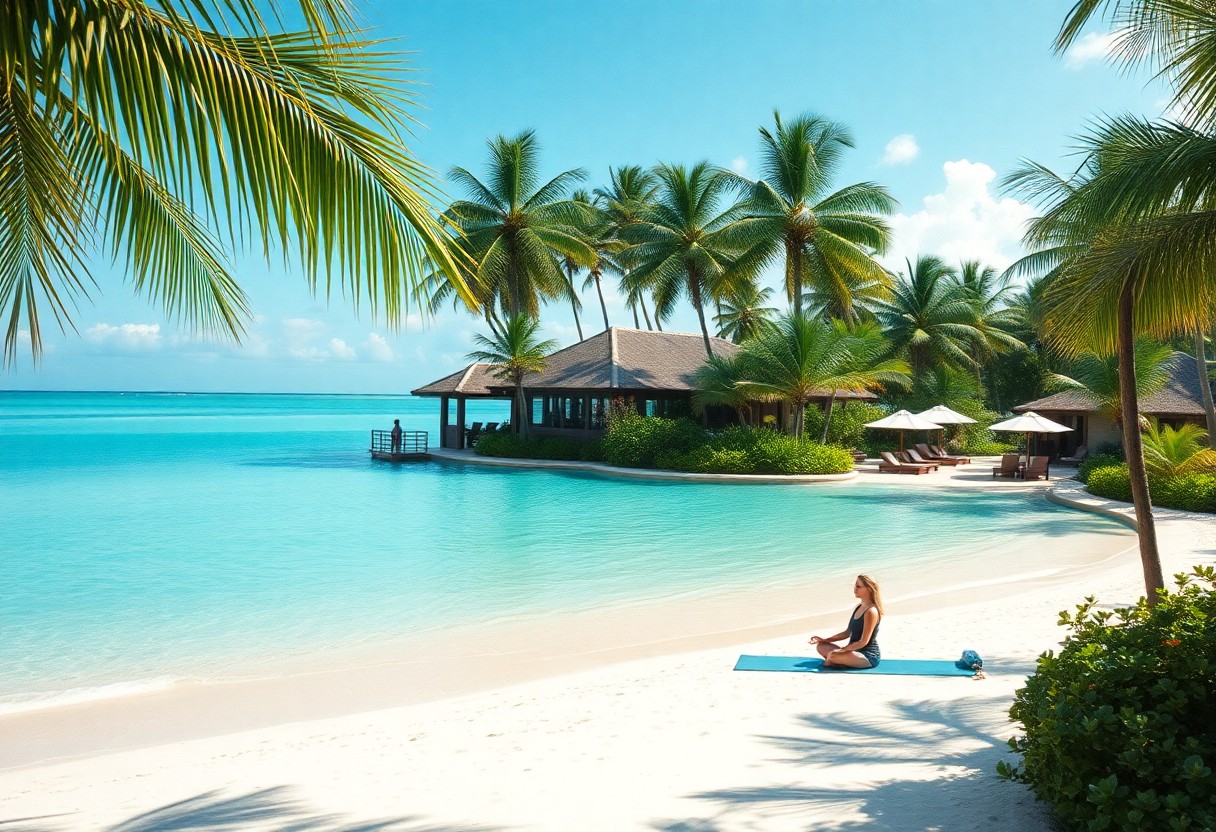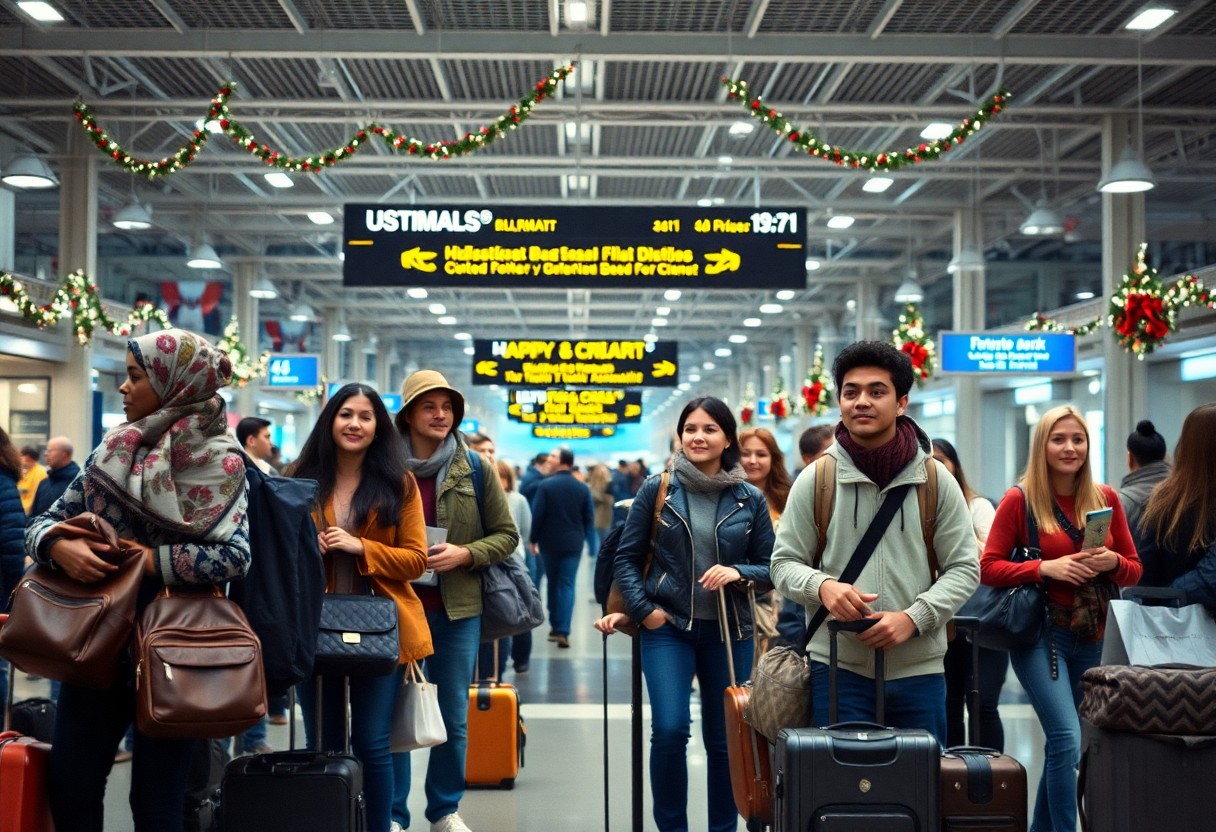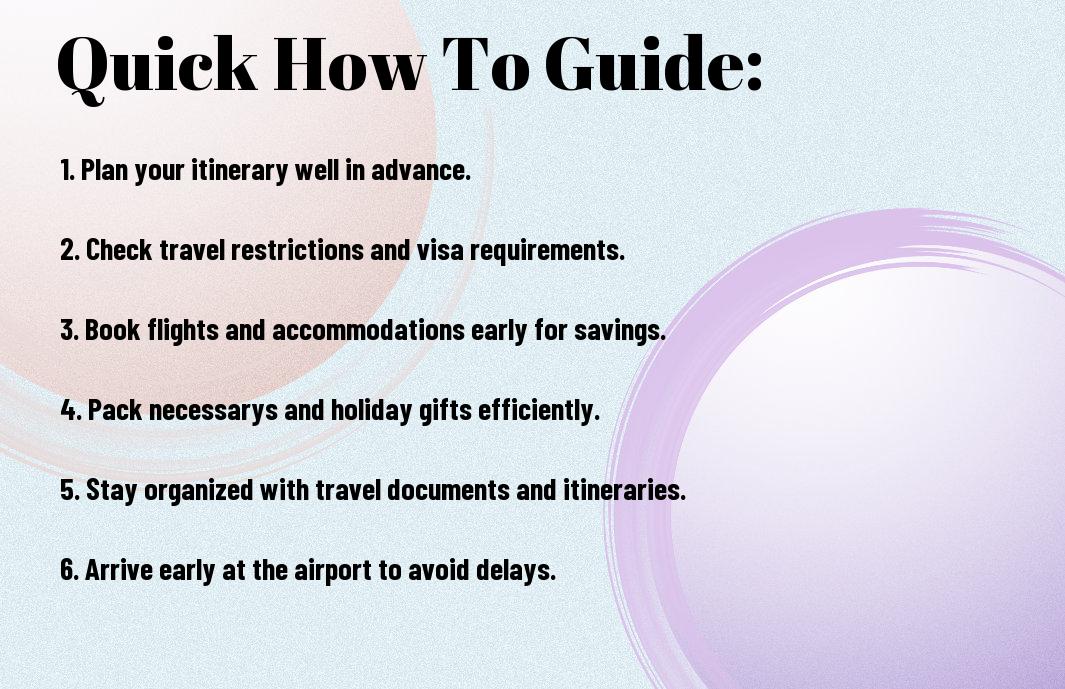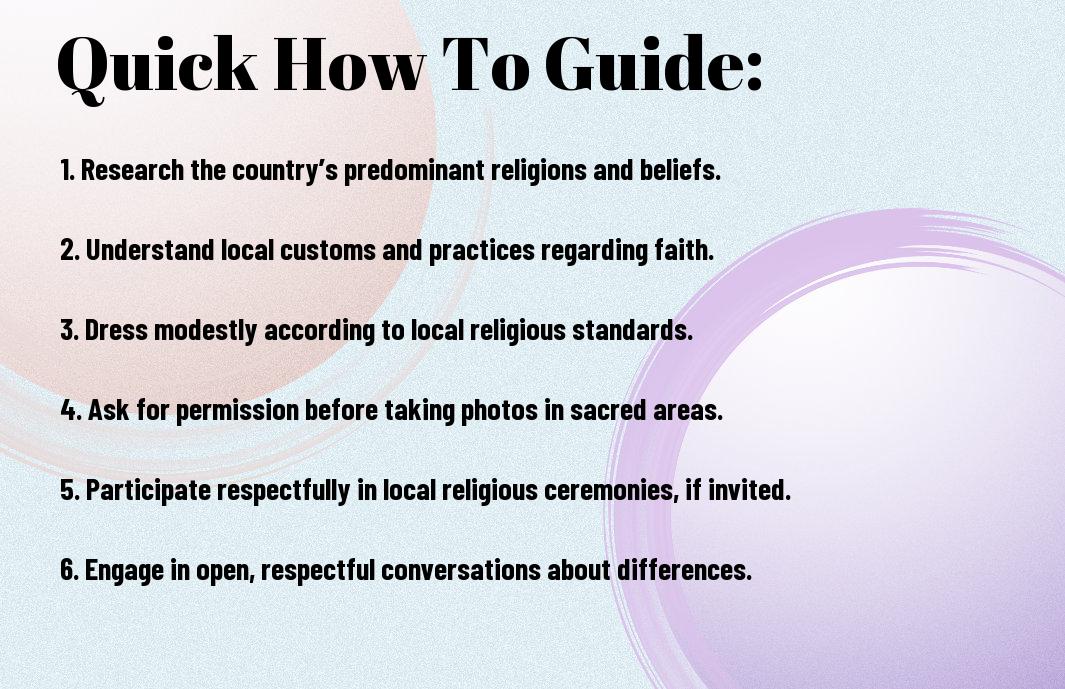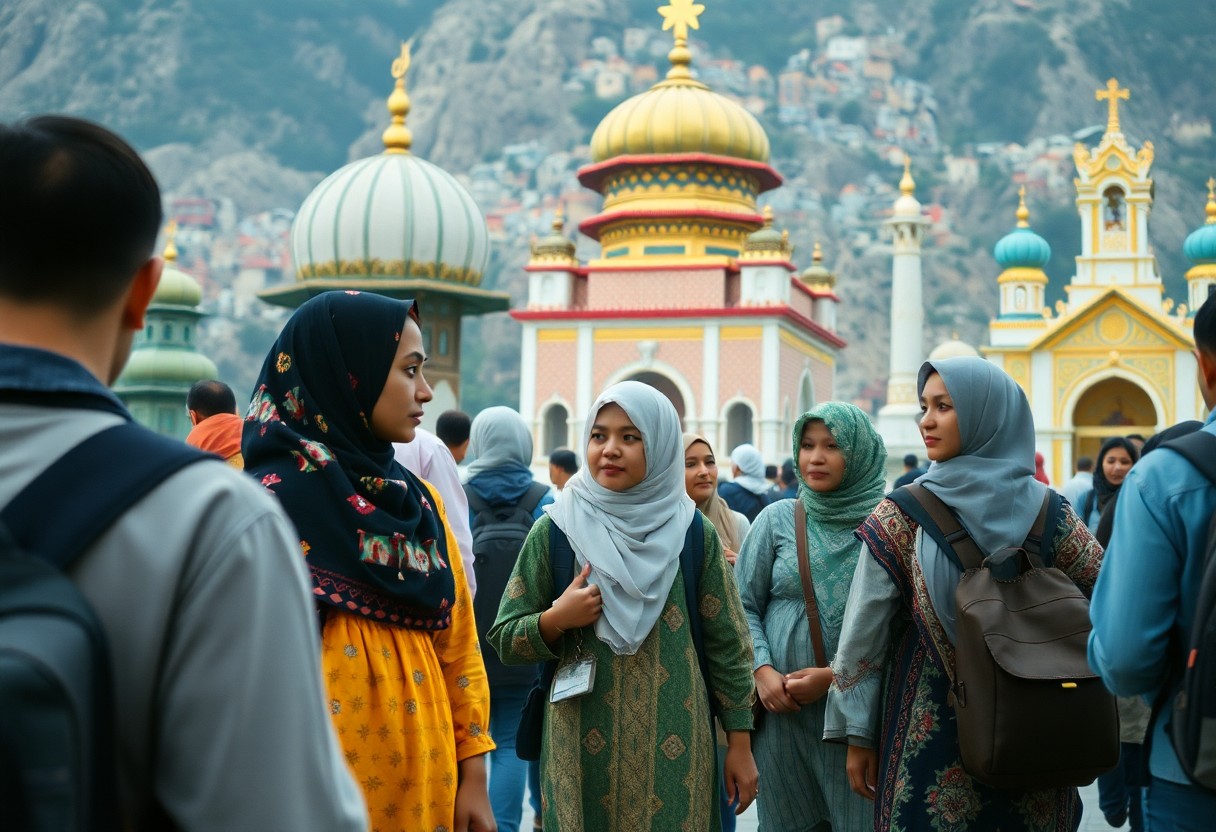There’s a world full of history waiting for you to explore, and as a history buff, your thirst for knowledge can be quenched at some of the most fascinating international destinations. From ancient ruins to age-old monuments, these ten locations offer a rich tapestry of culture, stories, and artifacts that will transport you back in time. Get ready to immerse yourself in the past and experience the remarkable history that shapes our present. Here’s your guide to the top ten spots that every history enthusiast should add to their travel bucket list.
Key Takeaways:
- Diverse Offerings: Each of the top destinations provides a unique blend of historical significance and cultural experiences.
- Ancient Civilizations: Locations like Rome and Egypt allow visitors to explore the remnants of ancient civilizations through stunning architecture and archaeological sites.
- War History: Cities such as Berlin and Hanoi offer deep insights into military history and the impacts of war on culture and society.
- Art and Architecture: Historical destinations often showcase remarkable artworks and architecture, reflecting the eras they represent.
- Local Narratives: Engaging with local historians and guides can enrich the travel experience, providing personal stories and contexts behind the historical landmarks.
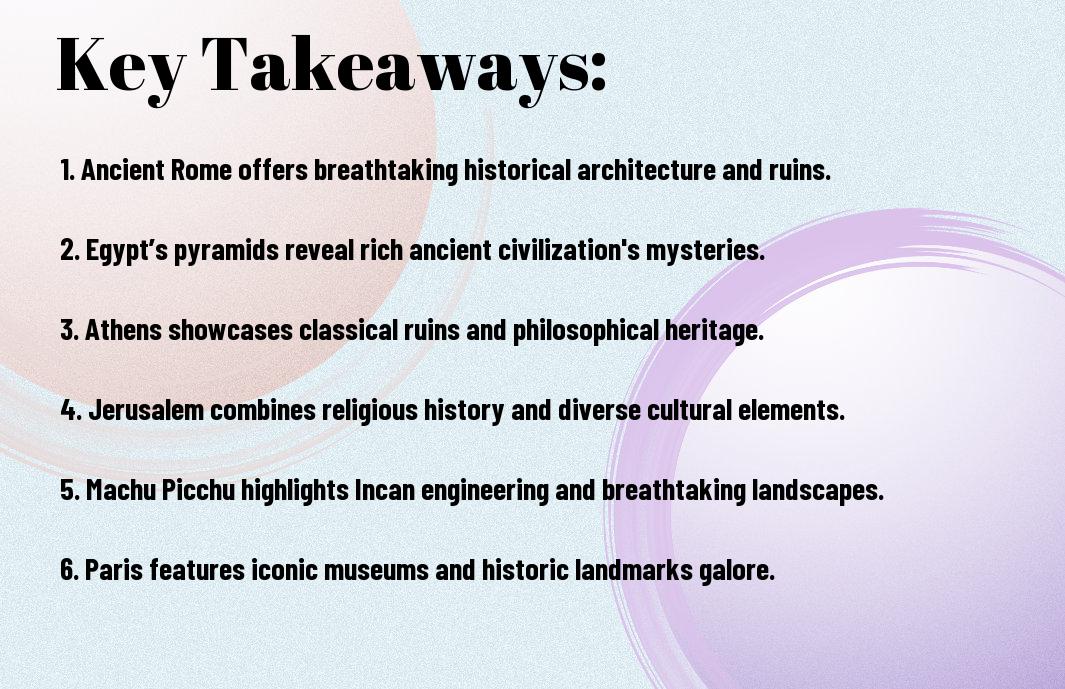
Rome, Italy
While exploring Rome, you will find a treasure trove of history at every corner. This ancient city offers a fascinating glimpse into the past with its well-preserved ruins, stunning architecture, and a rich cultural heritage that dates back thousands of years. As you wander through its vibrant streets, you will realize why Rome is often dubbed the “Eternal City,” inviting history buffs to dive deep into its captivating stories and legendary figures.
Colosseum
The Colosseum stands as a monumental testament to Rome’s grandeur and its architectural prowess. This iconic amphitheater once hosted gladiatorial contests and public spectacles, drawing crowds from all over the empire. Visiting the Colosseum allows you to immerse yourself in the fascinating tales of ancient Rome and appreciate the engineering marvel that has withstood the test of time.
Vatican City
To experience a unique blend of history and spirituality, Vatican City is a must-visit destination in Rome. Home to the Pope and a treasure trove of art and architecture, this independent city-state is steeped in rich traditions. Here, you can explore St. Peter’s Basilica, with its magnificent dome, and admire the breathtaking frescoes of the Sistine Chapel, painted by Michelangelo.
Italy’s Vatican City is a microcosm of history and art that leaves a lasting impression on every visitor. As you stand beneath the awe-inspiring dome of St. Peter’s Basilica or gaze upon the intricate details of the Sistine Chapel, you will feel the echoes of centuries past. Engaging with the spiritual and artistic legacy found within these sacred walls provides an unparalleled opportunity to understand the depth of Catholicism and its influence on Western civilization.
Athens, Greece
Even though Athens is the cradle of Western civilization, it offers so much more than just its iconic monuments. As you stroll through its ancient streets, you’ll uncover layers of history that have shaped modern thought and culture. From classical philosophy to the birth of democracy, each corner of the city harbors stories that every history enthusiast will appreciate. Whether you’re contemplating the teachings of Socrates or marveling at grand temples, Athens invites you to immerse yourself in its rich past.
Acropolis
Some of the most significant historical landmarks in the world are found at the Acropolis, where the Parthenon stands proudly as a testament to classical architecture. As you explore this UNESCO World Heritage site, you’ll gain insight into ancient Greek religious practices and civic pride that shaped the very foundations of democracy.
Ancient Agora
Ancient Athens was a bustling hub of civic life, and the Ancient Agora was its heart. This marketplace not only hosted merchants but also served as a gathering place for political discussions and philosophical debates, making it a vital part of Athenian democracy.
To truly appreciate the Ancient Agora, take your time to wander among its ruins and envision the daily life of Athenians who engaged in trade and oratory here. Key structures like the Stoa of Attalos, which has been reconstructed into a museum, give you a glimpse into the past. As you stand in the same spot where great thinkers once debated, you can feel the pulse of history that resonates through the ages. The Agora is a reminder of the birthplace of ideas that continue to influence society today.
Cairo, Egypt
Your journey to Cairo, Egypt, a treasure trove of ancient history, promises to enrich your understanding of the majestic civilizations that once thrived here. The city is a vibrant hub, where centuries of history seamlessly blend with modern life. From the bustling streets to the echoes of the past, your exploration will reveal impressive monuments, fascinating museums, and a wealth of stories that illustrate Egypt’s pivotal role in shaping human history.
Pyramids of Giza
While traversing the sands of time, the Pyramids of Giza stand as a testament to ancient engineering and ambition. These iconic structures, built as monumental tombs for pharaohs, have captivated visitors for millennia with their grandeur and intricate design. As you approach the Great Pyramid, the largest of the three, you’ll be awestruck by its scale and the mysteries it holds within, inviting you to ponder the ancient civilization that mastered the art of construction and aligned these wonders with the stars.
Luxor Temple
Luxor Temple is a striking example of ancient Egyptian architecture, showcasing the grandeur and skill of its builders. This temple, dedicated to the god Amun, is not only an architectural marvel but also a historical site rich with stories of pharaohs and gods who inspired its construction. As you walk through its massive, intricately carved columns, you’ll feel the ambiance of rituals and celebrations that once filled the air, immersing you in the spiritual heart of ancient Egypt.
Plus, the temple is home to exquisite hieroglyphs and monumental statues that provide insight into Egyptian mythology and the power dynamics of the past. You’ll discover the Ramses II statue, which stands proudly at the entrance, alongside the remarkable obelisk that once graced the center of Place de la Concorde in Paris. As dusk falls, the temple is beautifully illuminated, offering a stunning backdrop for reflection on the rich cultural heritage that has influenced generations. Luxor Temple is truly a must-visit for anyone seeking to explore deeper into the legacies of ancient Egypt.
Jerusalem, Israel
Once again, Jerusalem stands as a living testament to the rich tapestry of human history. This sacred city is a melting pot of cultures and religions, where ancient sites coexist with modern life. As you stroll through its streets, you’ll encounter unparalleled historical landmarks that have shaped spiritual journeys for millions. With landmarks significant to Judaism, Christianity, and Islam, Jerusalem offers a unique opportunity for you to explore diverse narratives that have influenced history across the globe.
Western Wall
Some of the most profound connections to history can be felt at the Western Wall, an imperative religious site for Judaism. As you approach this ancient remnant of the Second Temple, you may feel the weight of centuries of devotion and reverence. Whether you leave a note in its cracks or simply observe the faithful gathered here, this location will deepen your understanding of Jewish spirituality and heritage.
Old City
To fully immerse yourself in Jerusalem’s history, a visit to the Old City is imperative. This UNESCO World Heritage site is divided into four distinct quarters—Jewish, Christian, Muslim, and Armenian—each rich with its own cultural and historical significance. As you navigate its narrow, winding streets, be prepared to encounter ancient churches, vibrant markets, and centuries-old architecture that tell stories from diverse epochs.
City life in the Old City is an echo of history, where every corner invites you to discover more about the past. You can visit the Church of the Holy Sepulchre, which is believed to be the site of Jesus’ crucifixion and resurrection, or explore the historic bazaars filled with artisanal goods. Each step you take reverberates with stories of empires, conflicts, and faith, offering you a chance to connect with a timeless narrative that has shaped civilizations. Engaging with the vibrant community here will provide you with insights into the daily lives of those who inhabit this remarkable space steeped in rich traditions.
Machu Picchu, Peru
All history enthusiasts must visit Machu Picchu, a UNESCO World Heritage site that stands as a testament to the ingenuity of the Inca civilization. Perched high in the Andes, this ancient citadel offers breathtaking views and a glimpse into a rich past. As you explore the well-preserved ruins, you will uncover the fascinating stories of how the Incas thrived in harmony with their surroundings. This iconic destination is a journey back in time that you won’t want to miss.
Incan Ruins
Even when you set your eyes on the intricate stone structures and terraces of Machu Picchu, you’ll be transported to a vibrant era of Incan culture. The skillful craftsmanship and precise construction are astounding, demonstrating the advanced engineering abilities of the Inca people. Each ruin has its own history and significance, offering rich context for your exploration.
Sacred Valley
Now, take a step further into the heart of the Inca Empire by venturing into the Sacred Valley. This stunning area is punctuated by traditional villages, fertile lands, and ancient ruins. You can immerse yourself in the vibrant culture, exploring the local markets and experiencing the enduring traditions that have persisted for centuries.
This valley is not only an archaeological wonder but also a vital agricultural region that sustained the Inca civilization. As you stroll through colorful markets in towns like Pisac and Ollantaytambo, you’ll witness the blending of ancient practices with modern life. The Sacred Valley serves as a beautiful backdrop to your adventure, linking you with the past while enriching your understanding of Incan history.
Beijing, China
After exploring ancient civilizations, you will find yourself captivated by Beijing, a city that offers a timeless journey through China’s rich history. As the capital, it boasts remarkable cultural heritage, including ancient architecture and storied landmarks. From its imperial past to modern developments, every corner tells a tale worth discovering, making it an necessary destination for any history buff.
Great Wall
If you seek an iconic historical site, the Great Wall of China should be at the top of your list. Stretching over 13,000 miles, this magnificent structure symbolizes Chinese ingenuity and resilience. You can hike along various accessible sections, soaking in breathtaking views while imagining the soldiers and workers who painstakingly constructed it to protect the empire.
Forbidden City
You’ll be mesmerized by the Forbidden City, a UNESCO World Heritage Site that served as the imperial palace for over 500 years. As you wander through its vast courtyards and intricately designed halls, you’ll feel the weight of history enveloping you, providing insight into the lives of emperors and their families.
Any visit to the Forbidden City reveals a stunning collection of artifacts and culturally significant artworks, allowing you to immerse yourself in the grandeur of the Ming and Qing dynasties. As you explore the palatial complex, take your time to appreciate the detailed architecture and vast collection of treasures within its walls, giving you a deeper understanding of China’s imperial history.
Paris, France
Not only is Paris known for its art and romance, but it also serves as a significant hub for history enthusiasts. You can wander the cobblestone streets of this grand city, where each corner reveals a piece of the past—from medieval architecture to revolutionary landmarks. Every visit promises a journey through history, making it a must-explore destination for anyone passionate about the stories embedded in time.
Notre-Dame Cathedral
If you’re drawn to Gothic architecture, the iconic Notre-Dame Cathedral is a must-see. This monumental structure, with its intricate carvings and stunning stained glass, has stood witness to centuries of French history. Despite the recent fire in 2019, restoration efforts are well underway, allowing you to appreciate its majesty even more, while understanding the resilience that defines both the cathedral and the city itself.
Palace of Versailles
Clearly, the Palace of Versailles is synonymous with grandeur and royal history. As you stroll through the opulent halls and sprawling gardens, you can almost hear the echoes of Louis XIV’s court. Every inch of the palace speaks volumes of political machinations and power struggles that once unfolded within its walls.
For instance, the Hall of Mirrors, where key treaties were signed, showcases the magnificence of the French monarchy, while the stunning gardens designed by André Le Nôtre are a testament to 17th-century landscaping artistry. Exploring the various rooms, each with its own story, allows you to dive deep into the culture and life of the French aristocracy. Your visit to Versailles will deepen your appreciation for France’s historical legacy and offer a vivid glimpse into the lives of those who shaped it.
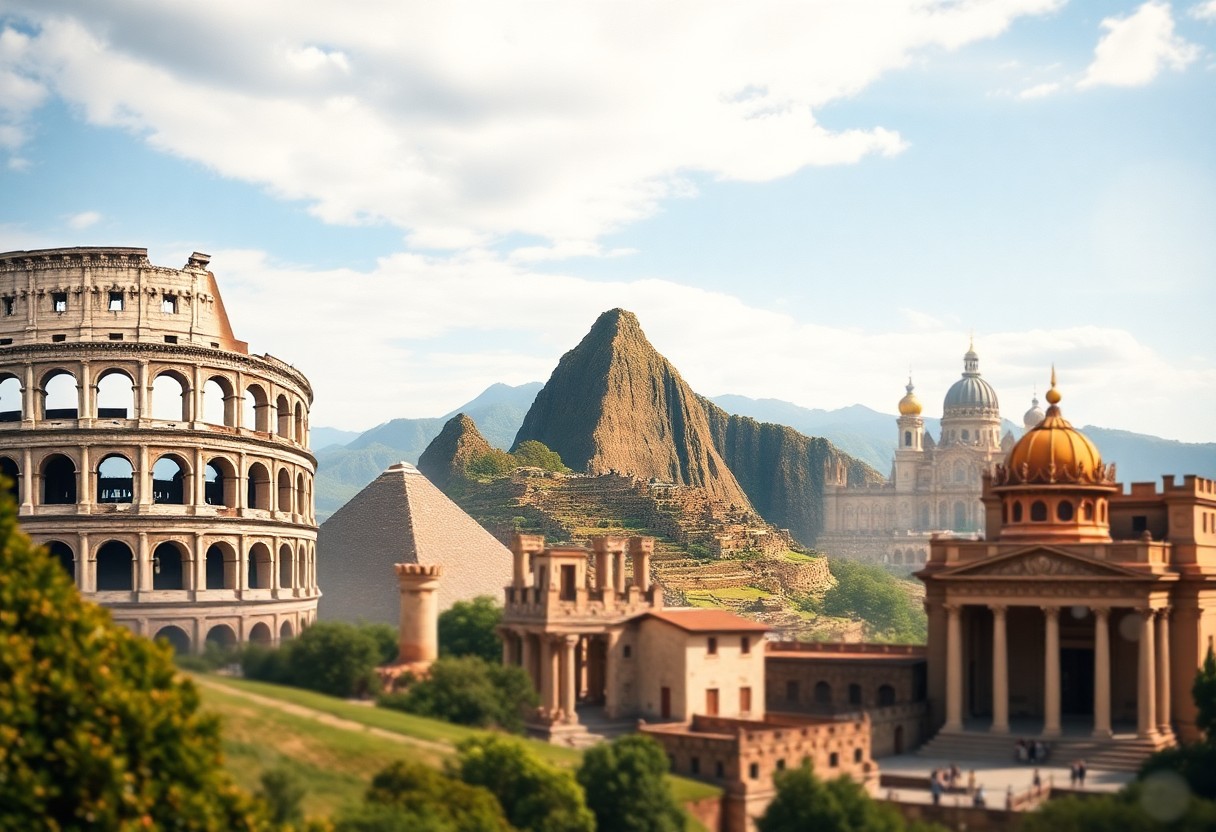
Istanbul, Turkey
Now, if you’re seeking a vibrant blend of history and culture, Istanbul is your go-to destination. This city is a fascinating crossroads of East and West, where each corner narrates a unique story. With its stunning architecture, ancient markets, and rich history, Istanbul offers you a deep probe civilizations that shaped the world as we know it. From Byzantine churches to Ottoman palaces, your historical journey starts here.
Hagia Sophia
Little can compare to the awe-inspiring beauty of Hagia Sophia. Once a cathedral, then a mosque, and now a museum, this architectural marvel reflects the intricate tapestry of Istanbul’s religious history. As you step inside, the vast dome and splendid mosaics beckon you to explore centuries of art and faith.
Topkapi Palace
For history aficionados, Topkapi Palace offers an intimate glimpse into the lives of Ottoman sultans. This sprawling complex showcases lush courtyards, lush gardens, and lavish rooms that once buzzed with royal life. It’s not just a palace; it’s a treasure trove reflecting the opulence of the Ottoman Empire.
To truly appreciate the grandeur of Topkapi Palace, you should explore its impressive collections, including the imperial treasury and the sacred relics of the Prophet Muhammad. Each artifact tells a story, providing insight into the power dynamics and cultural practices of the sultans. Don’t miss the chance to wander through the harem quarters, where you can better understand the private lives of the royal family, adding layers to your historical exploration of Istanbul.
Stonehenge, England
Keep your curiosity alive as you explore the enigmatic Stonehenge, a UNESCO World Heritage Site that captures the imagination of history enthusiasts. This ancient structure, shrouded in myths and mysteries, dates back to approximately 2500 BC and serves as a testament to prehistoric engineering and culture. Visiting Stonehenge not only allows you to witness magnificent stone circles but also invites you to ponder the rituals and beliefs of the Neolithic peoples who constructed it.
Ancient Monument
Assuming you examine into the significance of Stonehenge, you’ll discover that it is much more than just a collection of stones. It represents an ancient monument that has stood the test of time, reflecting the spiritual and communal practices of early human societies. As you witness its grandeur, you may find yourself contemplating the purpose it served and the lives of those who built it.
Neolithic Structure
Stonehenge is a remarkable Neolithic structure that illustrates the advanced understanding of architecture from that era. Its iconic stone circle, featuring massive sarsen stones and smaller bluestones, showcases the ingenuity and dedication of its builders.
For instance, the layout of Stonehenge is believed to be aligned with the movements of the sun, suggesting that its creators had a sophisticated knowledge of astronomy and seasons. This alignment is evident during the summer and winter solstices, drawing countless visitors each year to witness the sun rising or setting in remarkable ways. Exploring Stonehenge allows you to connect with the past and reflect on the achievements of a society whose legacy continues to captivate your imagination.
Petra, Jordan
Despite being a remote destination, Petra captivates history buffs with its stunning archaeological wonders and rich cultural heritage. As one of the New Seven Wonders of the World, this ancient city carved into rose-red rock offers a glimpse into the thriving Nabatean civilization that flourished over 2,000 years ago. Walking through its dramatic landscape, you will immerse yourself in a history that has shaped the region for centuries.
Rose City
An iconic aspect of Petra is its nickname, the Rose City, attributed to the striking hue of the sandstone cliffs that surround it. This vibrant coloration not only enhances the visual allure but also reflects the natural beauty of the area. As you explore, you will find yourself surrounded by breathtaking structures like Al-Khazneh (The Treasury) that rise beautifully from the rosy landscape, making your journey unforgettable.
Archaeological Site
Archaeological remnants in Petra are a testament to the ingenuity and artistry of the Nabateans. The site is expansive, featuring elaborate tombs, temples, and water conduit systems that showcase the advanced engineering skills of this ancient civilization. As you wander through the site, you can trace the paths of ancient trade routes and visualize the bustling activity that once filled this magnificent city.
Petra is rich in archaeological significance, with extensive exploration revealing new insights into Nabatean life. The remains of sophisticated water systems demonstrate how they thrived in a challenging desert environment, while the intricate rock-cut architecture provides a stunning visual narrative. Each step you take reveals carvings and structures that echo the vibrant history of trade and culture, allowing you to connect with the past on a profound level.
To wrap up
From above, you now have a curated list of the top 10 international destinations steeped in history, each offering a unique glimpse into the past. Whether you’re wandering through the ancient ruins of Rome or exploring the rich narratives of the Great Wall of China, these locations will enrich your understanding and appreciation of history. Each destination provides an opportunity for immersive experiences that let you connect with the stories that shaped our world. So pack your bags and get ready to launch on a journey through time!
Q: What are the top 10 international destinations for history buffs?
A: The top 10 international destinations for history buffs include: 1) Rome, Italy – known for its ancient ruins such as the Colosseum and the Roman Forum; 2) Athens, Greece – home to iconic historical sites like the Acropolis; 3) Cairo, Egypt – featuring the Pyramids of Giza and the Sphinx; 4) Jerusalem, Israel – a city rich in religious history; 5) Machu Picchu, Peru – the iconic ruins of the Inca civilization; 6) Paris, France – known for its historic architecture and museums; 7) Istanbul, Turkey – where East meets West and showcases Byzantine and Ottoman history; 8) Beijing, China – home to the Great Wall and the Forbidden City; 9) Angkor Wat, Cambodia – the largest religious monument in the world, steeped in history; and 10) Stonehenge, England – a prehistoric monument with significant archaeological importance.
Q: What types of historical experiences can one expect at these destinations?
A: At these historical destinations, visitors can expect to engage in a mix of experiences that include guided tours of ancient ruins, exploring museums filled with artifacts, attending workshops on traditional crafts, and participating in cultural events. For example, in Rome, tourists might take a guided tour of the Vatican and its Sistine Chapel. In Athens, one can walk through the Agora while learning about ancient democracy. Additionally, many of these places offer immersive experiences such as reenactments, food tastings related to historical dishes, and local folklore presentations that provide a deeper understanding of the region’s heritage.
Q: How can travelers enhance their visit to these historical sites?
A: Travelers can enhance their visit by doing some pre-trip research to understand the historical significance of each site. Booking guided tours with knowledgeable historians can provide insights that self-guided visits may lack. Learning a few key phrases in the local language can also make the experience more engaging. Additionally, it might be beneficial to participate in local workshops or take guided walks that offer a more intimate look at the culture and history of the area. Travelers should also consider visiting during off-peak seasons to enjoy a less crowded experience, allowing more time to absorb and appreciate the historical context of each destination.


